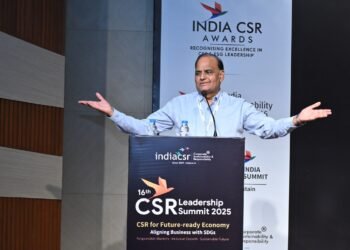In India, SAVWIPL aims to make the manufacturing carbon neutral by 2025 while its parent – the Volkswagen Group targets net zero by 2030.
India CSR Network interviewed Sanjay Khare, VP & Director at SKODA AUTO Volkswagen India, to discuss challenges, interventions, achievements and plans. Excerpts:
What are the targets for Sustainability with Environmental, Social, Integrity & Governance being the three pillars of Sustainability?
SKODA AUTO Volkswagen India Pvt. Ltd. (SAVWIPL) believes in a sustainable manufacturing footprint with net zero environmental impact. We are working to minimize environmental impacts, along the entire lifecycle for all our products and mobility solutions.
We as an organization expect quality in all spheres of life, especially in health and education. To improve education in the region, we have donated branded cars and engines to the Industrial Training Institutes for the learning and training of the students to acquire latest technology in automobile and then create a talent pool not only for the company but for other automobile manufactures. We are also very health conscious and as an initiative we organize various health awareness camps for our employees and for common people in nearby vicinity and the society at large.
What is the action plan? Please describe the initiatives.
SAVWIPL has constantly been active on sustainability & social responsibility. The Group believes environmental protection is a responsibility shared by all of us and as the global providers of vehicles and mobility services, we are keenly aware of the responsibility for environmental and climate protection.
On Earth Day, SAVWIPL organized #Project1Hour which is a team workshop for employees in all units and at all levels. It mainly consists of a climate quiz, a Co2 rapid test and a group task dedicated to ideas for individual climate action. Ideally, this will result in employees making a voluntary commitment to reducing their personal carbon footprint and generate ideas for Co2 reduction within their own teams.

In India SAVWIPL aims to make the manufacturing carbon neutral by 2025 while its parent – the Volkswagen Group targets net zero by 2030.
SAVW has also adopted the ‘goTOzero’ strategy. This covers the topics of climate change, resources, air quality and environmental compliance and aims to minimise the environmental impact of all products and mobility solutions throughout their life cycle – from the extraction of raw materials to the end of their service life. Overall Specific (per car) Resource Index comprises of two global factors –Energy & CO2 and three Local factors-Water, Waste & Volatile Organic Compounds) which is targeted to be -45% by 2025 as compared to 2010 levels. We are well on our way to achieve the same.
What are the achievements so far?
SAVWIPL recently earned the distinguished ‘Net Water Positive’ certification by DQS India Pvt. Ltd. This certification is the second sustainability win for the company, post the ‘Zero Waste to Landfill’ certification awarded last year by TUV Nord. It is also certified as meeting the GOLD standard for our sustained initiatives toward water conservation and replenishment activities across its manufacturing operations.
In the year 2020, the manufacturing facility has become water positive. As part of the environment drive, nearly 30 per cent of its energy needs are being derived from solar power. Along with this, SAVWIPL adopted several sustainable manufacturing practices. Some of them are listed below:
Watershed management programmes for farmers in Latur District in April 2019: SAVWIPL signed an MoU with International Association for Human Values (IAHV) for a watershed management project in Latur district. The company had committed INR 1.34 crore for this project that seeks to restore and sustain natural resources in selected village cluster of – Lasona, Indral, Wadmurambi and Ambanagar.
SAVWIPL partners with Mangrove and Marine Biodiversity Conservation Foundation for mangrove conservation efforts in Raigad, Maharashtra: The company partnered with the Mangrove Foundation for restoration of degraded mangrove forests in Alibaug, coastal town of Raigad, Maharashtra.
SAVWIPL gifts an Oxygen Park to Aurangabad: The park has over 15,000 densely planted plants and trees, with potential to sink high levels of Co2 emission emerging from the industrial belt in the region.
One of the biggest rooftop solar power in India: 8.5 MWh Solar Power Plant – The capacity of the Solar Power Plant at SAVWIPL is 12,200,000 Kwh/annum. The solar power plant serves 20% of the company’s energy requirement and saves 9000 tonnes of Co2 per annum.
Are any programs or initiatives planned for climate change? If yes, please explain.
2021 could become a turning point in international climate policy. Moreover, the company aims to achieve worldwide climate neutrality by 2050 at the latest.
As mentioned above, we will be celebrating the #Project1Hour on Earth Day to mobilise our employees around the world to take climate action, both at work and in their private lives.
We believe with the workforce of close to 4500 colleagues in India as the ambassadors have the potential to drive a positive change in building an eco-friendly mechanism in the company. Whether it is saving energy in production, choosing a mode of transport on business trips, or privately switching electricity providers, reducing their own meat consumption, or avoiding waste, everyone can contribute to combating climate change in their private and professional environment.
Describe the future aspects of the company in terms of Sustainability
SAVW is adopting the Green Future Strategy of Skoda Brand. ‘GreenFactory’ combines all the measures that contribute to resource-saving production. The cornerstone ‘GreenProduct’ focuses on developing vehicles that are as environmentally friendly as possible, including fuel consumption as well as the materials used and their recyclability. In the key area of ‘GreenRetail’, ŠKODA addresses the environmentally friendly management of its dealerships and workshops.
SAVWIPL has voluntarily committed towards the environmental well-being by reducing their personal carbon footprint and generate ideas for CO2 reduction within their own teams. The shift towards automotive technology and latest mechanisms can help to continuously improves the quality and environment management system.






















